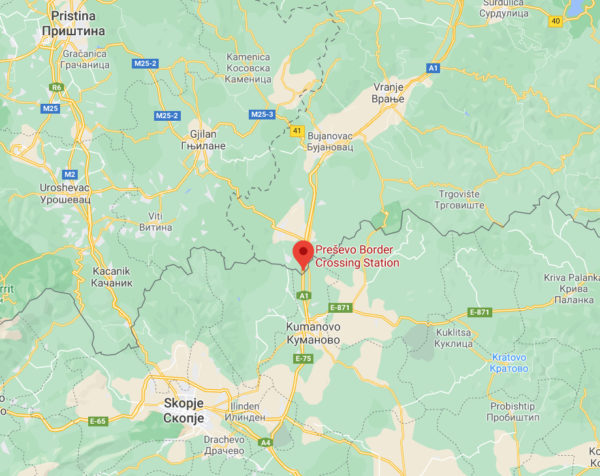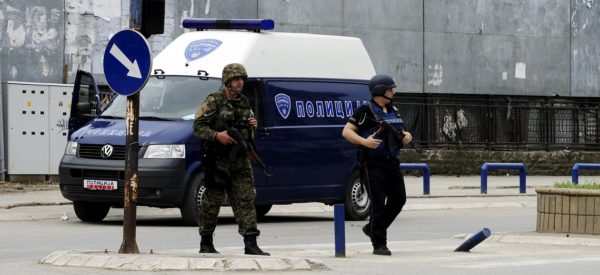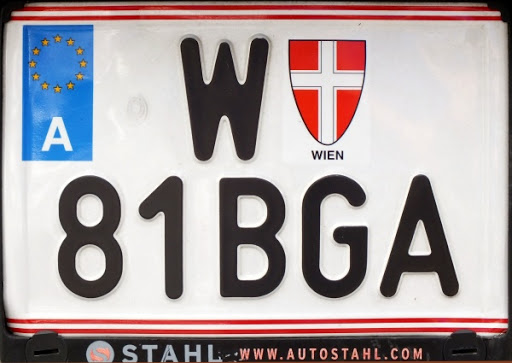The respondent has experienced multiple pushbacks, prolonged periods of detention and several traumatic events. All of which occurred over the course of several months in four separate countries. As a result, this testimony contains a degree of imprecision, especially surrounding dates and timings.
Such is to be expected from someone who has endured violence and psychological abuse. However, where possible, the BVMN has supported the respondent’s claims with corroborating evidence, while conceding any absence of detail wherever it may lie.
The respondent is a twenty-year-old Tunisian man. Sometime in May 2020, he stowed himself away in a freight train near Thessaloniki, Greece that was bound for Serbia. Clinging to the underneath of the carriage – a highly-dangerous practice which frequently leads to serve injuries – the respondent passed through Greece and North Macedonia.
At the “first stop” in Serbia, the respondent was detected by a group of Serbian police officers. Given his description, this was presumably the Preševo Crossing on the Serbian-North Macedonian border. According to the respondent, these officers gave him “food, clothes, a paper and one bus ticket to Belgrade”, the Serbian capital.

Upon his arrival to the city, the respondent was apprehended again by the Serbian police at the bus station. They were reportedly “kind” and explained that, due to the Covid-19 pandemic, he could not be outside. As the respondent described, “they [the officers] say with the peaceful words, no problem, don’t be afraid, don’t be stressed. They gave me the wrong image.”
It is unclear whether these officers had coordinated with those at Preševo.
“They locked us in”
The respondent was interned in a detention centre near Belgrade. He could not recall its name nor the exact location, but explained that it was outside of the city, “almost at the Romanian side”. Without greater detail, it cannot be discerned which facility the respondent was referring to as there are multiple in this area.
Uncommonly for Serbia, the respondent noted that conditions inside the facility were “fine”. Basic humanitarian aid, medical treatment and sleep quarters were adequately provided. There was, however, pervasive security. “We [were] not allowed to leave. There is military all [around] the fence. Patrols are everywhere”, said the respondent.
Two weeks later, the Serbian military was brought in to “clear the camp.” The respondent estimated that it was now the end of May or beginning of June. He stated: “one night … special forces [arrived], they start to take our phones, they take our papers, they catch us and place us in the truck”. This assertation that it was the military is based on the respondent’s observation that they “wore military costumes, with masks, guns, everything.”
A high degree of violence was allegedly perpetrated during this process. As the respondent explained, “if you resist, they will push you, they will put you in cuffs … or worse.”
According to the respondent, the entire facility was emptied of detainees. Yet with the location unclear, the BVMN cannot verify the number of those involved. In the respondent’s words, there were “hundreds of trucks outside”.
Everyone was loaded into trucks. When asked how many people were with him, respondent replied: “they [the police] said eyes down. I cannot remember that much … if you look up, they will hit you. It is a tramatis[ing] moment, you cannot think”.
“Cuffed like a criminal”
After an long drive, the respondent and the others he had been transported with were “left free” in a forest on Serbian-North Macedonian border. While the frontier separating the two is largely porous, often lacking fencing, the respondent’s description matches that of the woods surrounding Starac.
This area has hosted pushbacks in the past.
What happened next is a scene of pandemonium. Shortly after walking into the North Macedonian interior, the group men encountered a unit of Macedonian police. As the respondent stated, “everyone tried to run free, people were running everywhere, but the Macedonian police caught me”.
When apprehending him, two officers charged the respondent. One struck his leg causing it to buckle, while the other drew his fire arm ordering the respondent to stop. Meanwhile, a third officer approached from behind and shoved him to the ground. Despite stating that he was in pain, the officers responded “no English, no English” and continued to kneel on his back.
Following this incident, the respondent was taken alone to a local police station. This could be in either Pelintse, Malontino or Ramno. It is impossible to tell.
What is clearer is the deplorable conditions in which he was detained. According to the respondent, his cell did not have a mattress – forcing the respondent to sleep on a concrete floor – and he suffered multiple incidents of racial abuse.
He spent several days here.

The respondent was then transferred to an unknown police station in Skopje and interned inside a “large room” with 16 other people, most of whom were from North Africa.
For several days, the respondent claimed the officers deliberated what to do with him. “Their choice was simple: push me back to Serbia or Greece”. Nothing was explained by the officers, nor were translators present.
In a practise that has commonly been identified by the BVMN, all the inmates had their personal belongings, including money, seized by the officers. Yet were paradoxically forced to buy their own food inside the station.
How the respondent’s responded to this situation is indicative of the desperate measures people-on-the-move (POM) must resort to. Wishing to avoid having his money confiscated, the respondent ‘hid’ it in his stomach. “When I entered the police station”, he explained, “I threw up my money”.
While detained, the respondent documented how numerous people – many of whom he recognised from the camp in Serbia – were brought to the station and placed inside his cell. “Everyday, they started to bring people, six, five, six, five”, he recalled.
Once their number reached 25, the officers loaded the respondent and the other inmates into a “military truck” and drove them to the North Macedonia-Greece border. Typical of the North Macedonian authorities, they were delivered to a point near railway tracks in the Gevgelija area.
“They say in the media that, they [Frontex] is protecting other countries from terrorists. But we are refugees.”
What the respondent witnessed at the border is highly important. He alleged that Austrian police were working in tandem with North Macedonian forces to perform pushbacks.
The respondent believed they were Austrian as the registration plate of their vehicle displayed an “A” with the stars of the European Union above it and had a red and white cross in the middle. Their uniforms also displayed the words “Polizi” and they spoke German amongst themselves. In the respondent’s words, “their job is to stop refugees coming from Greece.”
Frontex involvement in this area has long been reported to the BVMN, although this cannot yet be verified.

The respondent remarked: “at every frontier inside and outside of the EU, there is Frontex. Every border I go, they [are] there. In Albania, there is French police. Also in between Turkey and Greece”.
Although his interaction with the Austrian officers was limited (they simply told him to “shut up”), the respondent described how the officers removed his shoelaces and used them to bind his hands. “They don’t want to waste the cuffs”, explained the respondent.
With the Austrian officers present, the respondent was pushed back through a quasi-official gate in the Greek- North Macedonian border. More information about this can be found in the BVMN’s December Report.
The first settlement that respondent recalls seeing in Greece was Polikastro.
With a small group of North Africans, the respondent boarded a train to Thessaloniki.
“Sunglasses, guns.”
On its approach to the city, the train began to slow down as it passed through the Diavata area of Thessaloniki. The respondent described what followed: “I saw police everywhere. They asked me to get out of the train, because it was going slowly, they [the police] said jump!”
Suspecting that “something was wrong”, the respondent did not jump out of the train towards the police, but rather exited from the other side of the carriage. His friends, however, jumped towards the officers as they believed that they would receive a khartia. This refers to an ‘International Protection Applicant Card’, which affords the holder an entitlement to stay in Greece for a given time, while their asylum claim is processed.
After fleeing the train station, the respondent looked for somewhere to sleep in the city. That night those who had jumped towards the officers called him. They had been pushed back to Turkey. “The police beat them. They had blue marks everywhere on their bodies”, the respondent reported.
Despite wishing to continue his journey and try once again enter North Macedonia, the respondent decided to apply for asylum in Greece. He remained here for the remainder of the summer.
The respondent’s account of the Greek asylum system reveals glaring failures. Shortly after arriving in Thessaloniki, he visited an organisation that provided him with material support and the contact number of the asylum office.
The next morning the respondent called at 9:00 a.m. as instructed, yet could not get through. He repeated this over the next week, yet still to no avail. Some days later, the respondent was dismayed to discover that the telephone line only worked for one hour per day.
With 16,000 asylum-seekers in Thessaloniki alone, such a minuscule window is inevitably prone to congestion and delay.
“I think they [the police] was hunting”
Around the 25th of July, while the respondent tried to apply for asylum, he went for a walk. It was the height of summer and, not unlike any new arrival to a city, he wanted to “have a tour.”
After walking some distance, the respondent rested near an old harbour, where he was approached by two plain clothed police officers. He described what followed: “they [the police] said ‘give me paper.’ But I didn’t have because of the asylum office. I was illegal.” Seeing that he did not documentation, the officers pushed the respondent against a wall and cuffed him.
He felt that the police treated him “like an animal”.
The respondent was taken to Agios Athanasios, a detention facility for ‘illegal aliens’ on the outskirts of Thessaloniki. He remained here for sixteen days.
While the conditions inside the facility were reportedly adequate, the respondent was not provided with any information as to what would happen to him. This reportedly had adverse effects on his mental health.
“When we asked the police officers what’s the problem, they said ‘we don’t know’. Every day the same: we don’t know. We don’t know. I started to crack. My mind started to crack because it is a very tight place … there is no sun. There is nothing.”
As per the definition of the UN Convention Against Torture, indeterminate periods of detention can constitute a form of torture as it intentionally inflicts severe mental pain or suffering.
“A lot of terrifying things happen in that place”
A period of time passed until the respondent was loaded into a “big blue bus” and driven to Xanthi Pre-removal Detention Centre, north-eastern Greece. He was detained for approximately twenty days.
During this period, the respondent noted several concerns with the facility. Many of these, particularly surrounding violence and unsanitary conditions, are well documented by the BVMN. Lesser known, however, is that leaches are an endemic problem during the summer months. Or as the respondent called them, “the terrifying ones that live in the shadows.”
Perhaps more concerning is the use of numbers to name the detainees. Apart from the dehumanising effects of this practice, it attests to the sheer amount of individuals passing through the site. When the respondent arrived he was allocated the number 9836. Towards the end of his detention, he remembered encountering new arrivals with 1100.
The respondent shed light on how Xanthi is being used by the Greek authorities to stage pushbacks to Turkey. Drawing upon his discussions with other inmates, he gave the BVMN a detailed account of how they take place.
According to the respondent, before a pushback occurs, staff inform detainees that they will be released and taken to the train station, where they can travel to another destination. Hearing this, the respondent said “you cannot do anything, you wont run, you wont think, the only thing you think about is freedom.”
He continued discuss how detainees are then led in single file though a “fence near where you enter the camp … that [leads] to a car park filled with abandoned cars … like a car grave … but they lie with to them.”
Here a white van awaits them – “the famous white van” as the respondent called it – into which detainees are loaded and pushed back to Turkey.
“Me I am lost”
During his detention at Xanthi, the respondent applied for asylum and had one interview regarding his claim. While the BVMN cannot disclose any details of this, all of the respondent’s family have fled Tunisia, with several of his siblings receiving asylum status in Western Europe.
Several days passed.
On the 20th day, the respondent was informed by the Greek authorities that he had to travel to Athens for a second interview. Without money and only the clothes on his back, they released him later morning afternoon.
Although our interview took place only three days after his release, the respondent was sceptical about his chances of receiving asylum.
“I am sure they rejected me”.
